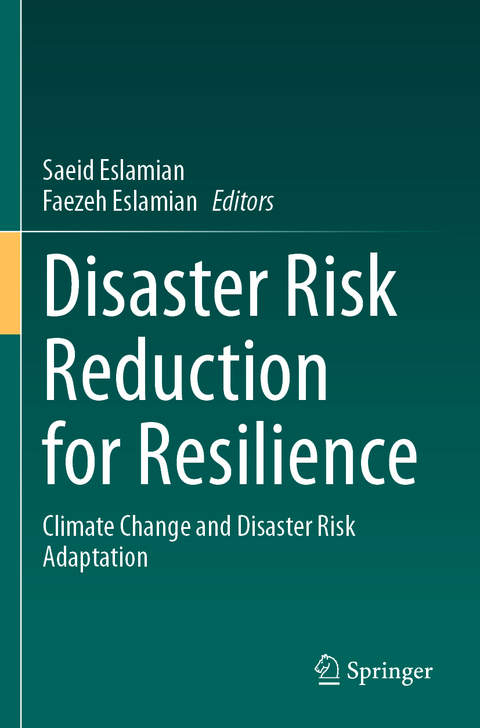
Disaster Risk Reduction for Resilience
Springer International Publishing (Verlag)
978-3-031-22114-9 (ISBN)
This book is part of a six-volume series on Disaster Risk Reduction and Resilience. The series aims to fill in gaps in theory and practice in the Sendai Framework, and provides additional resources, methodologies, and communication strategies to enhance the plan for action and targets proposed by the Sendai Framework. The series will appeal to a broad range of researchers, academics, students, policy makers, and practitioners in engineering, environmental science and geography, geoscience, emergency management, finance, community adaptation, atmospheric science, and information technology.
This volume offers indigenous approaches to disaster risk reduction, community sustainability and climate change resilience, as well as agro-ecological innovations for improving resilience to climate change. The focus is on adaptation strategies for sustainable terrestrial and marine ecosystems to reduce the impacts of anthropogenic factors that exacerbate disaster risk, including hydro-meteorological services for climate resilience, food security measures in agriculture and livestock, flood mitigation plans, and increased climate change education and awareness. The book concludes with three case studies in Africa detailing the impacts of strengthened climate change resilience measures, adaptive social protections, and improved water availability through hydro-electric technologies.Dr. Saeid Eslamian received his PhD from the Department of Civil Engineering, University of New South Wales, Australia, in 1995. He is now a Full Professor of Hydrology and Water Resources Sustainability at Isfahan University of Technology, the Director of the Excellence Center in Risk Analysis and Natural Hazards, and Chief of the Specialized Group on Water Resources Policy and Management, Research Center of Water and Wastewater. Formerly, he was a V. Professor at Princeton University, United States, University of ETH Zurich, Switzerland, and McGill University, Montreal, Quebec, Canada. Recently, he has been awarded as one of the World's Top 2% Scientists from Stanford University and is being Awarded as a High-level Jury Member and Invited Dialogue Person for the related organizations of the United Nations. Prof. Eslamian is the Founder and Chief Editor of the International Journal of Hydrological Science and Technology (Interscience) and Water Productivity Journal. Prof. Eslamian is also an editorial board member and reviewer for more than 150 Web of Science (ISI) Journals. He has contributed to more than 1K publications in journals, books, and technical reports, including publications from Elsevier, Springer, Wiley, Taylor and Francis, and IWA.
Chapter 1. Linkage Between Social and Hydrological Systems to Support Resilience: A Case of Freshwater Wetland in Bangladesh.- Chapter 2. Indigenous Approaches to Disaster Risk Reduction, Community Sustainability and Climate Change Resilience.- Chapter 3. The Adaptation to Climate Change in the Primary Education and Approach from the Social Sciences Textbooks.- Chapter 4. Building Climate Change Adaptation and Risk Knowledge In the Arctic Through Preparedness and Contingency Practices.- Chapter 5. Ecological Resilience for Transformative Climate Change Mitigation and Adaptation.- Chapter 6. Mitigating Disaster Risks and Vulnerabilities through Climate Finance and Sustainable Water Management: Policy Considerations for Sub-Saharan Africa and Malawi.- Chapter 7. Assessing Risks and Resilience to Hydro-meteorological Disasters.- Chapter 8. Flood Resilient Plan for Urban Area: A Case Study.- Chapter 9. Flood and Drought Risk Assessment, Climate Change and Resilience.- Chapter 10.Flood Risk Predictions in African Urban Settlements: A Review of Alexandra Township, South Africa.- Chapter 11. Anthropological Study of a Typical Drought Prone Village in India- Strategies for Sustainable Rural Habitat.- Chapter 12. Risk Management of Extreme Precipitation in Mexico: Building Resilience.- Chapter 13. Increasing Temperature Risk and Community Resilience: Urban Aspects.- Chapter 14. Climate Change Adaptation and Sustainable Development.- Chapter 15. Climate Change, Food Security and Resilience: Hydrologic Excess and Deficit Measurement.- Chapter 16. Climate Change and Agro Forestry Resilience Strategy In West Africa'S Cocoa Supply Chain Dynamics.- Chapter 17. Spatial-Temporal Changes of Water Resources: Associated Impact as a Natural Hazard.- Chapter 18. Vulnerability of Climate Change on Water and Sanitation Sectors and Coping Mechanisms by the Communities of Economically Poor Hard to Rich Areas of Bangladesh.- Chapter 19. Climate Governance, Resilience and Enterpreneurship In Nigeria: An Empirical Review.
| Erscheinungsdatum | 03.04.2024 |
|---|---|
| Zusatzinfo | XVI, 457 p. 134 illus., 117 illus. in color. |
| Verlagsort | Cham |
| Sprache | englisch |
| Maße | 155 x 235 mm |
| Themenwelt | Naturwissenschaften ► Geowissenschaften |
| Schlagworte | carbon emissions • climate adaptation • climate variability • Community sustainability • Ecological innovation • Flood mitigation • food security • Hydro-meteorological services • Land Use Change • Sustainable marine planning |
| ISBN-10 | 3-031-22114-1 / 3031221141 |
| ISBN-13 | 978-3-031-22114-9 / 9783031221149 |
| Zustand | Neuware |
| Haben Sie eine Frage zum Produkt? |
aus dem Bereich


